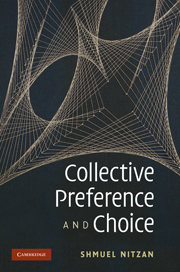Book contents
- Frontmatter
- Contents
- List of figures
- Preface
- Acknowledgments
- Part I Introduction
- Part II Different Preferences
- 4 Do social preferences exist? Arrow's and Sen's impossibility theorems
- 5 The desirable decision rule: axiomatization
- 6 Rule selection based on compromise with the unanimity criterion
- 7 Paradoxes of voting
- 8 Majority tyranny
- 9 The problem of inefficient provision of public goods
- 10 Do individuals reveal their true preferences?
- Part III Identical Preferences, Different Decisional Skills
- Bibliography
- Author index
- Subject index
8 - Majority tyranny
Published online by Cambridge University Press: 05 June 2012
- Frontmatter
- Contents
- List of figures
- Preface
- Acknowledgments
- Part I Introduction
- Part II Different Preferences
- 4 Do social preferences exist? Arrow's and Sen's impossibility theorems
- 5 The desirable decision rule: axiomatization
- 6 Rule selection based on compromise with the unanimity criterion
- 7 Paradoxes of voting
- 8 Majority tyranny
- 9 The problem of inefficient provision of public goods
- 10 Do individuals reveal their true preferences?
- Part III Identical Preferences, Different Decisional Skills
- Bibliography
- Author index
- Subject index
Summary
Social choice functions which satisfy Condorcet's criterion (see Section 4.2 and Section 7.2) are vulnerable to the problem of majority decisiveness: If a certain alternative is the most preferred alternative of more than 50% of the individuals (voters), then that alternative is always chosen by society, regardless of the preferences of the minority and, in particular, the intensity of its preferences. This problem can be resolved by increasing the required simple majority to a special or supra majority q, q > ½, or by augmenting the simple majority rule with constitutional constraints that protect the minority. The former solution is not satisfied with Condorcet's criterion and, in attempting to protect the minority, it insists that the choice function satisfies a stricter, more demanding, criterion; the chosen alternative should secure the support of a special majority in confrontation with any other alternative. The second solution attempts to protect the minority in an extreme way by preventing the choice of certain alternatives that violate the basic rights of the minority (alternatives that are considered unlawful). While the former solution discriminates among alternatives by creating a bias in favor of one of the alternatives, usually the status quo, the latter solution discriminates against individuals by creating a bias in favor of the minority. The first objective of this chapter is to clarify how the problem of majority decisiveness can be resolved or ameliorated by using scoring rules: unbiased voting rules which allow some restricted expression of preference intensities.
- Type
- Chapter
- Information
- Collective Preference and Choice , pp. 117 - 145Publisher: Cambridge University PressPrint publication year: 2009



